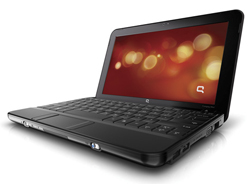Black Friday deals push netbooks below $200

When Asus announced the first netbook, the Eee PC, in mid-2007, it promised a price tag below $200. It has taken a little longer than expected to get there, but this coming Black Friday marks the first time that a variety of netbooks will be available for around $200 or less (not including the subsidized netbooks sold with two-year wireless data contracts). There have even been some rumors of $149 netbooks, but most of the deals I've seen to date range from $180 to a little more than $200. A few stores will also have budget laptops in this price range as well.

Office Depot posted its complete list of Black Friday deals today. It is selling the Acer Aspire One D250, a 10.1-inch model with the usual specs (Atom N270, 1GB, 160GB hard drive) and Windows XP Home for $200. This model has been around for a long time, but it remains one of the most popular netbooks. For $100 more (after a $50 mail-in rebate) you can pick up a Compaq G60 laptop with a 15.6-inch display, 3GB of memory, a 250GB hard drive and Windows 7 Home Premium.
With no doors to open Friday at dawn, Amazon has been running different Black Friday specials all week. Some of its current deals include two Samsung netbooks, the N110 and N120, for $319. The N110 has a 10.1-inch display, Atom N270 processor, 1GB of memory, 160GB hard drive, Windows XP Home and a 6-cell battery. The N120 is nearly identical but has an upgraded 2.1-channel audio. Samsung isn't a well-known netbook brand here in the U.S. but I've tested both of these models and they are well-designed with a large, comfortable keyboard. But the best netbook deal on Amazon.com may be the Asus Eee PC 1005HA, currently priced at $336.57. This 10.1-inch model, which uses the newer Atom N280 processor, has received excellent reviews for its long battery life and is include on many holiday gift guides this year--including mine. These are good prices but you can find these models at similar prices on other sites as well.
Like Office Depot, Target will offer the Acer Aspire One D250 for $200. But that price is only good for the blue model. Other colors start at $290, which is the usual price for the 10.1-inch netbook.
One big name missing from this list, Walmart, has not announced any Black Friday netbooks deals. They will, however, be selling a full mainstream laptop at a netbook price. The eMachines eME627 will be priced at $198 with a 15.6-inch display (1366 by 768), 1.6GHz AMD Athlon 64 TF-20, 2GB of memory, ATI Radeon HD 3200 integrated graphics, 160GB hard drive and Windows 7 Home Premium. Best Buy will match that with an HP Pavilion G60 with a 15.6-inch display with the same resolution, 2.2GHz Intel Celeron 900, 2GB of memory, Intel integrated graphics, 160GB hard drive and Windows 7 Home Premium for $197. Obviously these sub-$200 laptops are relatively under-powered, but with the larger displays, DVD drives and full version of Windows 7, they may be a better choice than a netbook for many users.